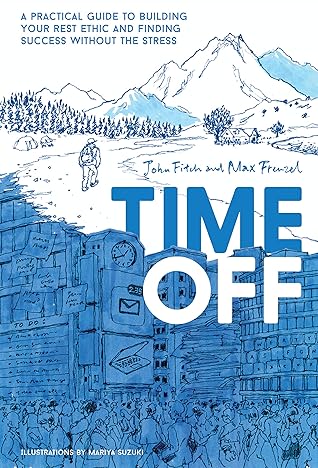More on this book
Community
Kindle Notes & Highlights
by
John Fitch
Read between
October 13 - November 5, 2020
Work is done for a purpose, a utilitarian goal. Leisure, on the other hand, is done purely for its own sake, in search of meaning rather than purpose.
Oleg Gavryliuk and 1 other person liked this
· Flag
Korey
And without leisure, we become a society without big ideas.
What activities bring you the most fulfillment outside of work? Have you been ignoring them?
Learn to practice noble leisure
Leisure: The Basis of Culture,
Knowledge needs space to breathe and time for contemplation.
It’s a commodity.
While chronos involves the quantity of time an activity takes, kairos looks at the quality of that time.”
We’re trying to squeeze more hours into our days because we are afraid of running out of it. But when we were younger, we were not this way.
Enjoy a No Chronos day
if he offered better working conditions than anyone else, he could easily attract the best talent.
Second, he figured that if people have no free time or are too exhausted to use their free time, they won’t spend much money.
People would think about how to work rather than just grinding things out.
and that the road to happiness and prosperity lies in an organized diminution of work.”
“The morality of work is the morality of slaves,”
“and the modern world has no need of slavery.”
Active engagement rather than passive consumption.
Instead, the extra time and energy should be reinvested into education and contributing to our culture.
Save some energy for your time off
pick a time at night where you turn off your devices or set an alarm for 30 minutes before your bedtime.
A culture of noble leisure.
time off from distractions in order to give undivided attention to the problem at hand.
Subconscious incubation happens whenever we fully immerse ourselves in something
“is level-headed instead of multi-level-headed; adaptive and not destructive; an enlightened conservative, not a revolutionary; willing to learn under proper guidance, but unable to be guided by his dreams.”
In an AI-enabled future, the jack-of-all-trades is likely to beat the master of one.
exploration beats specialization,
Practice slow-motion multitasking
happy ideas come unexpectedly without effort, like an inspiration.
Split your workday into several distinct parts: short bursts of high focus, with good types of rest in between
“The best rest for doing one thing is doing another thing,”
Relaxation, or allowing our mind and body to wind down. Control, or deciding how to spend our time and attention. Mastery, or being challenged enough to get into a flow state. Detachment, or being so absorbed that we forget about work.
To balance this, it’s good to have an element of control in your rest.
True rest is active and involves mastery experiences – experiences that are challenging and mentally absorbing enough to get us into a flow state
They are so engaging and demanding that they push everything else out of mind, leaving no space for rumination about work.
the ability to put work (or whatever else we are taking a break from) entirely out of our mind and attend to other things, which is crucial for physical and mental recovery.
It demands our full attention.
True idleness, he argued, has no desire to initiate motion because it is satisfied in itself. It doesn’t worry about the future. It is simple presence in the current moment.
“all of humanity’s problems stem from man’s inability to sit quietly in a room alone.”
It’s really the absence of meaning, not the absence of activity or stimuli, that makes us feel this way.
Employ crop rotation
Developing a little work shutdown ritual that clearly marks the transition from work time to rest time
This is particularly true for one of the most important forms of rest: sleep.
One week of six hours of sleep per night is just as bad as a single night with no sleep at all! Think about that for a second. How many sleepless nights have you accumulated over the last couple of months?
lack of sleep costs developed nations 1-3percent
running on low sleep is like trying to boil a pot of water on low heat.
if couples don’t sleep well, they are less emotionally and physically intimate.
being awake from 7am to 2am, is as bad for your cognitive abilities as being legally drunk
sleep very effectively heals emotional wounds through dreams.
Sleep, and particularly dreams, makes us more emotionally stable, and as a result, more empathetic and understanding of others.


